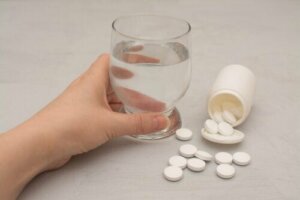Learn About the Consequences of Almagate Abuse

Almagate abuse has become a common phenomenon. Since it’s an over-the-counter drug in pharmacies, many patients see it as the solution to episodes of heartburn or stomach aches. However, it shouldn’t always be your first treatment choice.
What are the consequences of taking too much of this drug? Why should you avoid self-medicating? Although it rarely causes adverse effects, taking too much of it can cause adverse reactions. In this article we’ll tell you all about it.
What is almagate?
Almagate is an antacid drug that neutralizes stomach acids in a short time. Therefore, it’s indicated to alleviate the symptoms of heartburn or acid reflux. However, as we already mentioned, the abuse of this drug is a common problem.

What is it made of and how do you take it?
Its formula is based on aluminum and magnesium salts, and you take it orally. It’s indicated only in adults or in people over 12 years of age, in chewable tablets or oral suspension, up to a maximum of 8 grams per day and for a maximum of 14 days in a row.
You should take it separately from other medications by at least 2 or 3 hours, and 1 hour after meals. You never need a prescription to buy it. Hence the importance of being clear about who can’t take this medication and the possible consequences of almagate abuse.
Overdose can be intentional or accidental, and it’s when people use more than the recommended amount of the drug. The consequences of too much almagate has to do with the intake of an overdose of aluminum and magnesium salts.
In general, this happens due to the use of doses higher than those recommended, or by prolonged use for more than 14 days in a row. It’s a drug that people usually tolerate well in correct doses, and only occasionally causes mild diarrhea, which disappears when you stop treatment.
Discover: 10 Things you Need to Know about Antacids
What are the advantages of almagate?
Doctors recommend almagate, due to its low sodium content, for patients with hypertension. It also doesn’t contain calcium, so it doesn’t cause constipation. This is a very common feature of almost all magnesium and aluminum salt carbonate antacids.
What can almagate abuse cause?
In this case, we’re referring to taking almagate in excessive amounts, or for long periods of time. In elderly patients, the excessive consumption of almagate can aggravate certain existing conditions in the bones, such as osteoporosis and osteomalacia, due to the reduction of phosphorus and calcium ions.
Likewise, in patients with diarrhea, malabsorption, or a low phosphorus diet, or in very weak patients, this drug can cause anorexia and muscle weakness, osteomalacia, among other disorders.
With prolonged use, aluminum salts tend to form insoluble phosphates in the intestine, causing them to be poorly absorbed and excreted in the feces.
Almagate is not recommended for patients with kidney failure, whether mild, moderate, or severe. It’s a drug that, despite being over the counter, you must take with caution. We discourage high doses as they can cause an accumulation of aluminum and magnesium ions.

Almagate and other medications
Antacids modify the absorption of many drugs, so, in general, you should take them separately from any other drug. They decrease absorption of the following:
- Non-steroidal anti-inflammatory drugs
- Antiulcer drugs
- Digitalis drugs
- Chlorpromazine
- Lansoprazole
- Prednisone
With quinidine, its excretion is decreased due to the alkalization of the urine, which can enhance its toxicity.
Antacids containing aluminum salts shouldn’t be administered to patients with Alzheimer’s disease. Several studies claim that aluminum could contribute to the development of the disease, since it accumulates in the neurofibrils of the brain tissue.
In short, if after 14 days of treatment you notice that your symptoms continue or worsen, it’s important to consult your doctor.
All cited sources were thoroughly reviewed by our team to ensure their quality, reliability, currency, and validity. The bibliography of this article was considered reliable and of academic or scientific accuracy.
- AHFS® Patient Medication Information™. © Copyright, 2020. The American Society of Health-System Pharmacists®, 4500 East-West Highway, Suite 900, Bethesda, Maryland.
- Pfennig CL, Slovis CM. Electrolyte disorders. In: Walls RM, Hockberger RS, Gausche-Hill M, eds. Rosen’s Emergency Medicine: Concepts and Clinical Practice. 9th ed. Philadelphia, PA: Elsevier; 2018:chap 117.
- US National Library of Medicine website. Specialized Information Services. Toxicology Data Network. Calcium carbonate. toxnet.nlm.nih.gov. Updated June 30, 2014. Accessed April 30, 2019.
- Singh P, Salisbury BH, Terrell JM. Antacids. [Updated 2020 Apr 10]. In: StatPearls [Internet]. Treasure Island (FL): StatPearls Publishing; 2020 Jan-. Available from: https://www.ncbi.nlm.nih.gov/books/NBK526049/
This text is provided for informational purposes only and does not replace consultation with a professional. If in doubt, consult your specialist.








